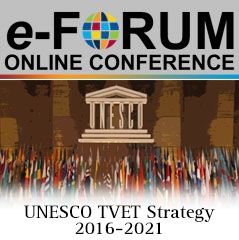
The UNESCO-UNEVOC International Centre: Who We Are | What We Do | Working With Us | Get in Touch
The UNEVOC Network: Learn About the Network | UNEVOC Network Directory
For Members: UNEVOC Centre Dashboard
Thematic Areas: Inclusion and Youth | Digital Transformation | Private Sector Engagement | SDGs and Greening TVET
Our Key Programmes & Projects: BILT: Bridging Innovation and Learning in TVET | Building TVET resilience | TVET Leadership Programme | WYSD: World Youth Skills Day
Past Activities: COVID-19 response | i-hubs project | TVET Global Forums | Virtual Conferences | YEM Knowledge Portal
Our Services & Resources: Publications | TVET Forum | TVET Country Profiles | TVETipedia Glossary | Innovative and Promising Practices | Toolkits for TVET Providers | Entrepreneurial Learning Guide
Events: Major TVET Events | UNEVOC Network News

 In the next edition of UNESCO-UNEVOC’s virtual conferences, we would like to discuss with you UNESCO’s future TVET strategy (2016-2021). The conference will take place from 28 September to 3 October 2015 on the UNESCO-UNEVOC e-Forum.
In the next edition of UNESCO-UNEVOC’s virtual conferences, we would like to discuss with you UNESCO’s future TVET strategy (2016-2021). The conference will take place from 28 September to 3 October 2015 on the UNESCO-UNEVOC e-Forum.
Background
UNESCO’s education sector, including technical and vocational education and training (TVET), currently finds itself at a crossroads. The attainment of the Education for All (EFA) goals by 2015, concurring with the adoption of the post-2015 development agenda at the United Nations Summit in September 2015, highlights the need to reconsider the role of the education sector in a more globalised world, accentuated by interlinkages between social, economic and environmental issues. The present situation affords an opportunity to reassert the importance of themes such as the right to education, equity in education, inclusive education, quality education and lifelong learning.
In this context, the development of UNESCO’s TVET Strategy for the period 2016-2021 comes at a timely and opportune moment. While the TVET strategy for the period 2010-2015 focused on the three core areas of providing policy advice and capacity building, facilitating conceptual clarification and improving TVET monitoring, and contributing to information exchange and the global TVET debate, the new strategy will no doubt be influenced and reflect the current social, economic and environmental landscape.
This Virtual Conference aims to act as a forum to collect insights from TVET experts which can act as input as UNESCO prepares its new TVET Strategy. The goal of the conference is to stimulate debate and knowledge sharing between participants on questions such as:
About the moderator
The virtual conference will be moderated by Professor Mike Campbell, OBE, an expert in the fields of skills, labour markets and the economy, focusing on research, policy analysis and strategic thinking. Mike has over 20 years’ experience and has worked as a senior researcher, consultant and adviser with business leaders, senior government officials and other partners, at national, international and local levels.Until May 2011, Mike was Director of Research and Policy at the UK Commission for Employment and Skills (UKCES), where he was responsible for advising Government on what was required to make the UK world class and for assessing the UK’s progress towards it. He holds a Visiting Professorship in Economics at Durham Business School and is a well-known public speaker and author of several books and many reports. Mike also has experience working in several countries and with international organisations, such as the OECD, the ILO and the EU.